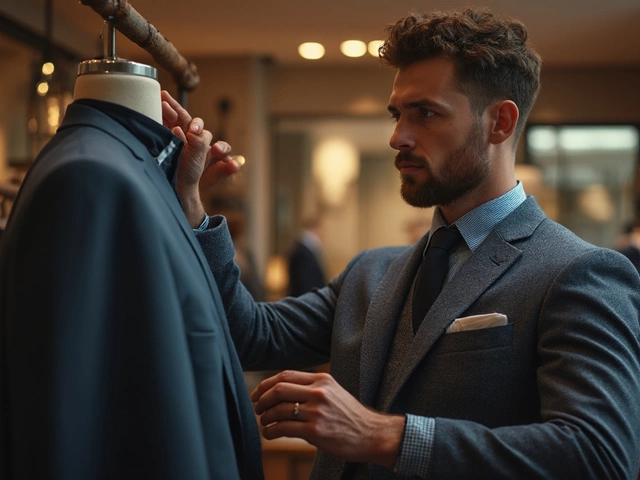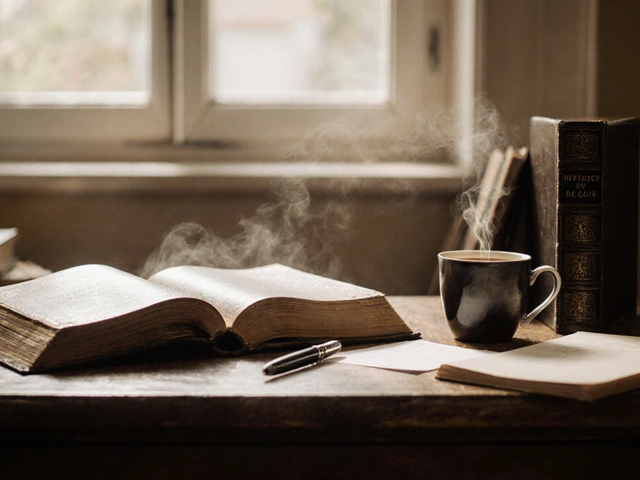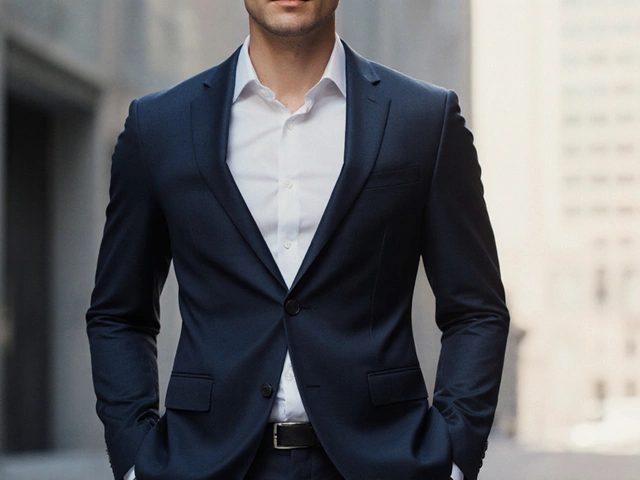Best Dress Colors for Evening Wear: What Actually Works?
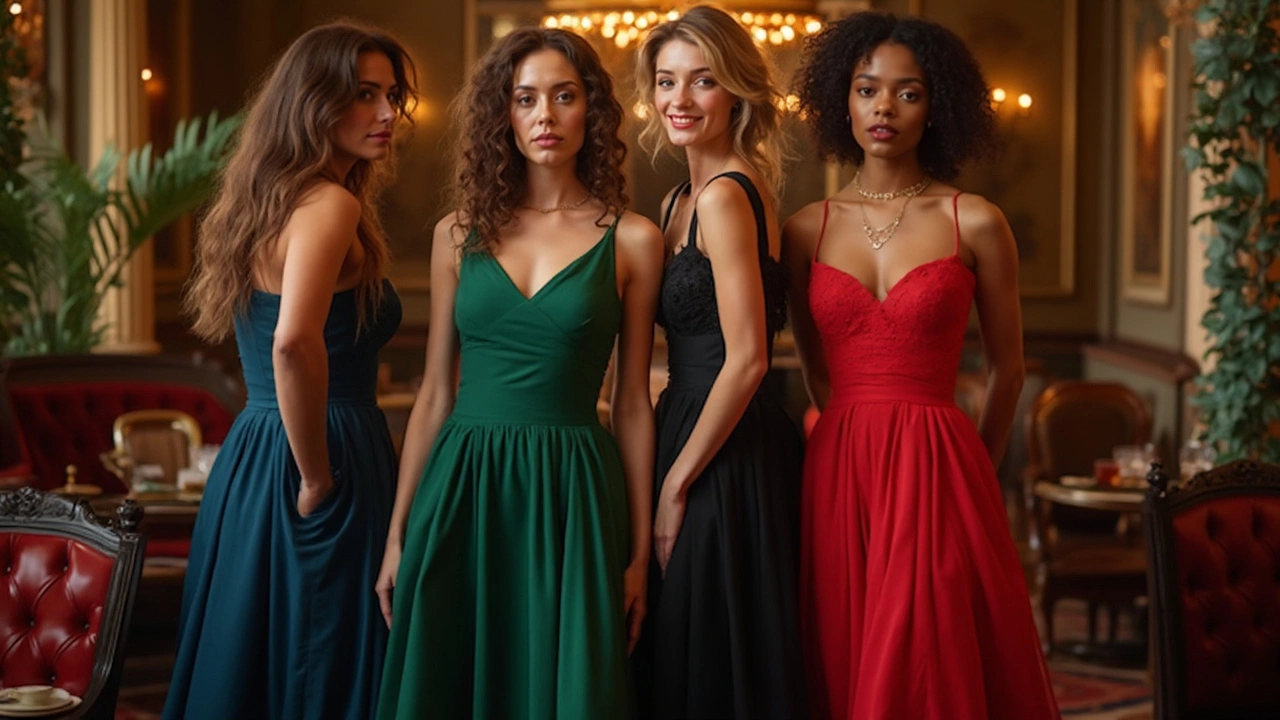
- Cleo Fairchild
- 8 June 2025
- 0 Comments
Picking out a dress for a night event feels like high-stakes fashion math. The wrong color can make your skin look dull or wash you out in pictures, while the right one makes you pop, even under moody restaurant lights or at a bright party. Color has way more power than people think—it sets your whole vibe before you even say hello.
You know that feeling when you slip into a black dress and suddenly channel endless confidence? There’s a reason black is always a favorite for evening wear. But colors like navy, red, emerald green, and even deep plum also own the night—each one has its own magic.
The trick? Don't just follow the crowd or grab whatever's trending on TikTok. Think about what actually flatters you under evening lighting, matches the mood of the event, and feels right for your personality. When you know how color works for you and the setting, getting ready for your next evening out won’t feel like a gamble.
- Why Color Matters After Dark
- Classic Evening Dress Colors That Never Fail
- Finding the Right Shade for Your Skin Tone
- Making a Statement with Trendy Colors
- Tips for Matching Colors to the Dress Code
- How Accessories Impact Your Dress Color Choice
Why Color Matters After Dark
Lighting totally changes how colors look. What you see in sunlight can seem way different after sunset or under indoor lamps. That's why picking the right color for your evening dress can make or break your look. Walk into most parties or restaurants, and you'll notice softer, warmer lighting. This lighting can mute certain colors or make some shades look even richer.
Some colors—like black, deep navy, or jewel tones—tend to soak up light just enough to create sharp, flattering outlines. Pastels or pale colors, on the other hand, might end up looking washed out if the room is lit with yellow or dim bulbs. Science backs this up! A study by the International Association of Lighting Designers found that blue and red fabrics kept their depth and appeal under typical nighttime lighting, while pale pinks and yellows often lost definition and punch.
| Color | How It Looks Under Warm Light | How It Looks Under Cool Light |
|---|---|---|
| Black | Classic, sharp, timeless | Bold, high contrast |
| Navy | Deep, sophisticated | Rich, elegant |
| Red | Lively, attention-grabbing | Vibrant, strong |
| Pale Peach | Faded, sometimes dull | Can look slightly greyish |
| Emerald | Vivid, striking | Luxurious, rich |
If you want your dress to stand out in a sea of people or show up great in photos, paying attention to color is key. Neutral shades might feel safe, but under evening lights, they can blend into the background. Bolder, deeper colors make you memorable.
Just remember: It’s not just about looking great in the mirror at home. Think about the lighting at the venue—does it have yellow mood lights, bright white LEDs, or disco colors everywhere? Knowing this helps you pick something that makes your evening dresses really work for you, from first impression to last dance.
Classic Evening Dress Colors That Never Fail
There’s a short list of colors that pretty much never let you down when it comes to evening dresses. Seriously, these are the MVPs of formal wear. Black, navy, deep red, emerald green, and even metallics like gold or silver stick around for a reason—they work over and over again, no matter what year it is or what trend is blowing up your feed.
Let’s break down why these shades are so reliable:
- Black: The longstanding king of evening fashion. It flatters every body type and skin tone, it’s instantly slimming, and it’s always considered stylish. Coco Chanel made the little black dress famous back in the 1920s, and it’s still a go-to for a reason.
- Navy: If you want something just as dark as black but slightly softer, navy is your best friend. It looks clean and classy, especially under artificial lights. Plus, it suits just about everyone.
- Deep Red (like wine or burgundy): There’s actual science behind why red stands out. Researchers have found that people rate red clothing as more attractive during social events. Deep shades are bold without being loud.
- Emerald Green: This color works wonders against tanned or olive skin, but it also pops on lighter complexions. Emerald looks rich and high-end, keeping things lively without going over the top.
- Metallics (Gold & Silver): These aren’t just for the super bold. Gold flatters warmer skin tones, while silver lights up cooler undertones and looks amazing in candlelight or party lighting.
Check out how these classic colors have shown up on red carpets—Oscar ceremonies are practically a masterclass. Black and red make up nearly half of the evening dresses worn at high-profile events, according to fashion roundup reports.
| Color | Percent of Red Carpet Dresses (2024 Oscars) | Best For |
|---|---|---|
| Black | 34% | Everyone, all skin tones |
| Navy | 11% | Most complexions, subtle elegance |
| Deep Red | 13% | Evening wear with impact |
| Emerald Green | 8% | Olive and fair skin tones |
| Metallic (Gold/Silver) | 9% | Making a bold entrance |
At the end of the day, any of these colors can be a solid choice for evening wear, especially if you’re just starting to build your wardrobe. They won’t look dated in photos, they suit a range of styles, and you can have fun with your accessories without things getting out of hand.
Finding the Right Shade for Your Skin Tone
Ever stood in a dressing room, staring at your reflection, wondering why a certain dress color just isn't working? It usually comes down to skin tone. Pairing the right shade with your complexion does way more than people think—it can lift your face and give you that fresh-from-vacation glow. There are three main undertones: cool, warm, and neutral. Figuring yours out makes finding the perfect evening dresses color way easier.
Hold up your wrist under natural light. If your veins look blue or purple, you've probably got cool undertones. Greenish veins usually mean warm undertones. Can't really tell? You're likely neutral, which basically means most colors will suit you.
- Cool undertones: Jewel tones like sapphire, emerald, and true red work best. Icy pastels and silvers also pop against cool skin.
- Warm undertones: Go for earthy shades—think gold, olive, burnt orange, champagne, and warm terra cotta.
- Neutral undertones: Lucky you! Most shades look good, but blush pink, teal, or soft gray are extra flattering for evening.
If you want a quick cheat sheet, check out how skin tone pairs up with the most popular evening dress colors:
| Skin Undertone | Great Dress Colors | Colors to Avoid |
|---|---|---|
| Cool | Navy, plum, emerald, cool reds, silver | Yellow, orange, warm browns |
| Warm | Gold, coral, olive green, warm reds, bronze | Cool blues, icy pinks, silver |
| Neutral | Blush, jade, teal, soft white, gray | No strict rules—most colors are fair game |
Lighting is key, too. Some colors look stunning in candlelight or under dim chandeliers but lose their charm in harsh LED lighting. If you can, double-check your dress under the same type of lighting you'll have at your event. Trust me, this can totally change the way the color looks on you.
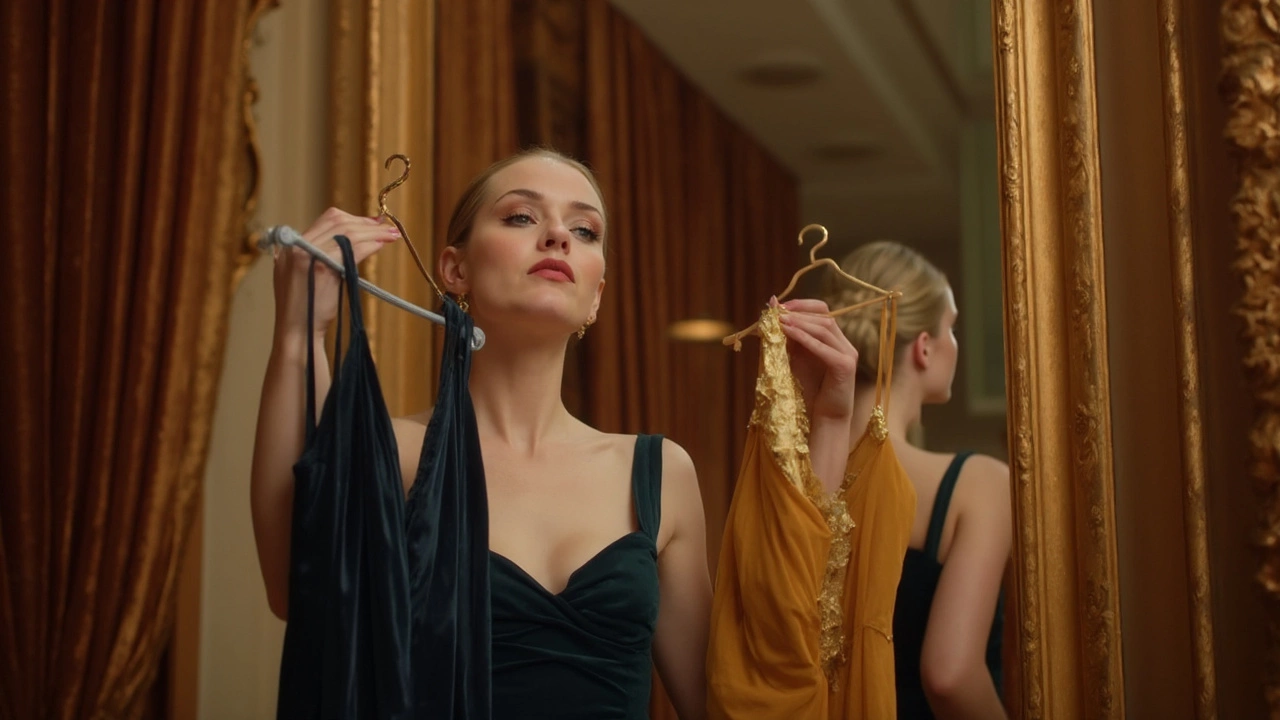
Making a Statement with Trendy Colors
If you’re bored of the usual black or navy, it’s totally okay to make some noise with your evening dress color. Fashion moves fast, so every season brings new shades that take over party scenes and red carpets. Right now, hot pink, cobalt blue, emerald green, and bold orange are making waves. In 2024, a report by Pantone said that "Peach Fuzz" was everywhere—from influencer feeds to designer runways—showing that even soft, unexpected shades can be evening-wear hits.
But here’s the deal: not every trendy color is easy to wear. Some shades look amazing on a hanger but might not work with certain skin tones or event vibes. If you really want to pull off a statement shade, try these tips:
- Check the lighting where you’ll wear the dress. Some colors glow under soft lighting but look odd in daylight or bright, white lights.
- Test a color against your skin: Hold the dress up in good lighting to see if your face looks fresher or tired.
- Balance a wild color with simple shapes—when the color is bold, skip the busy cuts or heavy embellishments.
- When in doubt, use accessories (like a silver clutch or nude heels) to keep everything grounded.
Let’s get specific. Here’s a snapshot of what celebrities and designers picked for evening dresses in 2024:
| Color | Spotted On | Event |
|---|---|---|
| Hot Pink | Zendaya | Met Gala |
| Emerald Green | Dua Lipa | Grammy Awards |
| Cobalt Blue | Hailey Bieber | Fashion Week Party |
| Peach Fuzz | Olivia Rodrigo | Music Video Release |
There’s no rule saying you have to pick a color that’s trending, but when you do, you’ll definitely grab attention. For anyone shopping evening dresses this year, remember that bold colors look best when you wear them with confidence. If you feel comfortable in it, others will notice for all the right reasons. And don’t forget, the real secret behind making a statement is how you carry your evening dresses, not just the color you choose.
Tips for Matching Colors to the Dress Code
Evening dress codes can get confusing, especially when invites throw around terms like "black tie," "cocktail," or "semi-formal." The color you pick needs to play by these rules, or you risk feeling super out of place. Let’s break down what works for each common dress code, so your outfit always fits the room.
| Dress Code | Preferred Colors | Avoid |
|---|---|---|
| Black Tie | Black, navy, deep red, emerald green | Bright neon, loud patterns, white (unless allowed) |
| Cocktail | Jewel tones, metallics, dark pastels | Super pale colors, anything too casual |
| Semi-Formal | Softer shades (mauve, dusty blue), classic black, any rich colors | Overly sparkly, very bright neons |
| White Tie | Black, dark blue, silver, gold, very deep hues | Short dresses, trendy prints, anything flashy |
Here are a few key tips so you don't end up wearing the wrong thing:
- Black tie means you’ll never go wrong with a dark, solid color. Even navy is a safe option if you want to dodge basic black.
- Cocktail attire lets you play with fun, evening dresses in rich or metallic colors, but skip anything that screams daywear.
- Semi-formal events are forgiving—a trendy shade or a lighter tone works as long as your dress feels polished, not super casual.
- If the invite says "festive" or has a fun theme, use that as a nudge to try something bold (think deep purple or gold).
- White tie is as formal as it gets, so keep it simple and classic—think Hollywood awards season style with zero wild prints.
Fact: A 2023 survey by a major wedding planning site found that 61% of guests actually worry more about color than dress length when attending formal events. Don't ignore that gut check—if the color feels off for the vibe, it probably is.
One last thing: Always check with your host if you’re stuck. Some events have special color traditions, like avoiding red at certain galas or not wearing white to weddings at all. When in doubt, elegant dark shades are the safest move for almost any night out.
How Accessories Impact Your Dress Color Choice
Accessories can totally change how your evening dress color looks—and how people see your overall style. Sometimes, the right earrings or clutch can make a simple dress feel dressy or help a bold color seem less over-the-top. It's not just about matching everything perfectly, either; it's about balance and a little bit of contrast.
For example, metallic jewelry (think gold, silver, or rose gold) goes with almost every evening dress color, but each shade brings something different. Silver tends to make navy and cool-toned dresses pop, while gold looks amazing with red or emerald. If your dress has bright or bold colors, neutral accessories help keep the focus on you, not your stuff.
Studies from fashion schools show that people usually remember outfits where there's a contrast between the dress and accessories. Like, a black dress with bright red shoes or a navy dress with crystal earrings grabs attention and feels fresh. On the flip side, a head-to-toe matching look can sometimes read as stiff, especially in evening photos.
- Pair deep jewel-toned dresses with simple nude or metallic shoes for an upscale vibe.
- Mix bold accessories like chunky necklaces with pastel or neutral dresses to create a fun centerpiece.
- If your dress has embellishments (rhinestones, sequins), play it safe with understated jewelry or a classic clutch.
Here's how some popular dress colors play with different accessory choices:
| Dress Color | Accessory Hues | Best For |
|---|---|---|
| Black | Gold, silver, emerald, ruby red | Maximum versatility |
| Navy | Silver, pearl, sapphire blue | Modern classic |
| Red | Gold, nude, black | Bold statement |
| Emerald Green | Rose gold, bronze, clear crystals | Glam factor |
| Pastels | White, blush, delicate gold | Spring and summer events |
A little planning goes a long way. Try snapping a photo of your whole outfit before the event—sometimes, colors and accessory combos look different on camera than in your mirror. If it pops in the photo, odds are you nailed the color match for the night.
